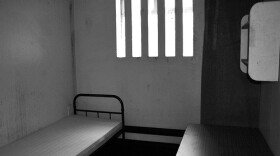A note of warning: there is some brief graphic language in the interview. Listener discretion is advised.

In the past two years, the Cotton Correctional Facility in Jackson has lost four correctional officers to suicide. Earlier this month, his family and co-workers honored Michael Perdue, a long-time CO at Cotton, who died by suicide this year.
Corrections officers across the state are hoping these tragic losses will bring attention to the pressures of working in prisons.
To support more reporting like this, consider giving to Michigan Radio today.
Cary Johnson has been a corrections officer at Cotton since 1995, and she is part of an effort by the Michigan Corrections Organization, the union representing corrections officers, to better understand the mental health issues that impact prison staff, including post-traumatic stress disorder (PTSD).
Johnson says that Michael Perdue’s suicide had a ripple effect throughout the prison.
"When Michael took his life, there were prisoners crying because they needed him. They checked in with him every day when they went to get their medication. They were impacted by the loss of that life too," she recalled.
Life as a corrections officer means working in a high-pressure, and sometimes violent, environment. Johnson says that requires officers to wear many different hats.
“It's a whole different world. It's a whole community. We are dealing with the day-to-day issues that men in prison deal with, and we're kind of the psychologist, the first assessors in a doctor’s office. We're parents, we're managing the day to day issues" she explained.
Balancing all of those responsibilities can be incredibly stressful. Johnson says that, over time, that stress starts to impact officers’ mental health. Adding to the stress, she says, is the fact that some Michigan prisons are short-staffed, including Cotton Correctional Facility. Those facilities often require mandatory overtime, which means officers can be on the job for 16 hours at a time, three to four days a week.
"You try to leave, and no, you're in prison too. You're staying, and you can make a phone call when you get relieved to do so," Johnson said.
Addressing the mental health stressors that correctional officers face, Johnson says, will require both cultural and structural changes. In the short-term, she says something as simple as creating daily group check-ins where supervisors and staff can connect every day would be helpful.
On the structural side, Johnson points to legislative initiatives like a recent bill introduced by State Senator Jim Runestad (R-White Lake) that would establish a suicide prevention commission. That commission would include a representative from the Michigan Corrections Organization.
This post was written by Stateside production assistant Katie Raymond.
(Subscribe to Stateside oniTunes, Google Play, or with this RSS link)




